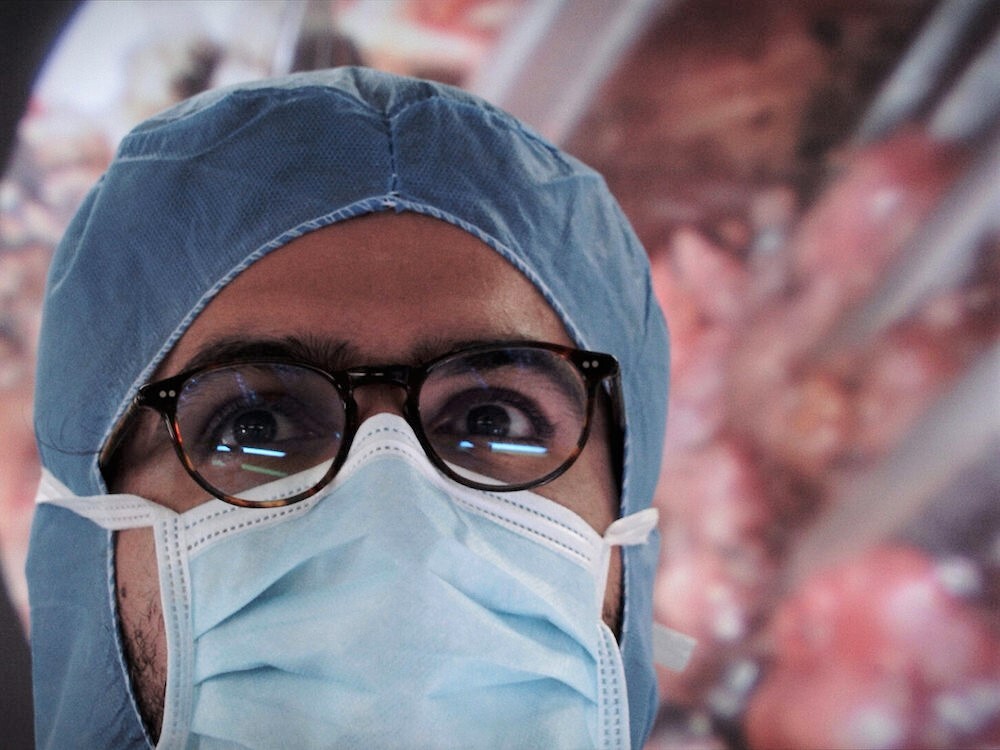De Humani Corporis Fabrica is a squelchy, squishy, often gory exploration of the medical arts. The latest effort by directors Véréna Paravel and Lucien Castaing-Taylor of Harvard University’s Sensory Ethnography Lab (which gave way to 2012’s Leviathan, an immersive documentary on life at sea) marks yet another milestone in their pursuit of visceral cinematic experiences. If you don’t faint in the middle of the movie, you might be amazed what surgeons and doctors are capable of.
Published in 1543, physician/anatomist Andreas Vesalius’s multiple volumes on the human body provides the film with its title, but make no bones about it, this a deeply contemporary work. The frustration, exhaustion and desperation of the current health-care system is well in evidence in almost every scene.
Made over the course of eight years in five hospitals in northern Paris, the film takes the temperature of what is happening in contemporary medicine. Understaffed and overworked, staff contend with an oft-bewildering number of situations that range from comedy to tragedy and back again. A man with dementia who compulsively pushes elevator buttons must be coaxed back to his locked room. In the dark din of a nightclub, doctors and nurses unwind in drunken revelry as Euro-disco thunders away in the background. The film covers a lot of ground.
Like most of the work of the Sensory Ethnography Lab, De Humani is a full-on immersion, akin to being thrown into deep end of the pool.
The surgical procedures, while limning the territory of the miraculous, are often surprisingly brutal and blunt. The procedures are akin to carpentry with screws, wrenches and physical strength involved. The cameras train their lens on the operating table while surgeons straighten a young man’s spine, drill through someone’s skull and heft babies out of bodies.
There were more than a few moments that I watched through my fingers. But after you get used to the more outré stuff, deep curiosity sets in. After all, we’re all made of the same ingredients — blood, bone, muscles and acres of ropey guts. Here’s an opportunity for a grand tour of one’s interior landscape.
Nowhere does the mundane and the miraculous mix to an almost overwhelming degree than in a scene dedicated to an emergency caesarean. With a young mother bleeding and the baby in distress, the team scrambles to prepare for the imminent delivery. What is most striking is the mixture of propulsive physical action required and the delicacy of handling a vulnerable new human. Even before the blood has been mopped up, the nurse lifts the new baby girl into the world. She weighs and measures her, checking her tiny fingers and toes. She welcomes her with endearments and cuddles.
In death, there is tenderness
Life is miraculous. But death is equally fascinating.
As the film makes explicit, not everyone can be saved. But just because people are no longer alive doesn’t mean that they don’t deserve a degree of dignity. In the morgue, workers clean, dress and prepare the dead, attended by a pop soundtrack from a nearby radio.
It’s the mixture of all these elements that proves particularly discombobulating. It’s grim but also funny, and above all strangely ordinary. Despite the fact that it’s a dead human that they’re working on, it’s also just another job that needs to be done.
The staff perform their tasks, practiced and infinitely capable, chatting as they go about their work, commenting on size of the dead man’s hands as they pull on his underpants and do up his suspenders. It’s not unkind, but it’s a portent that one day this kind of procedure is coming for us all. Would that we might be so gently and humbly attended to.
Meanwhile, in other parts of the hospital, microscopic cameras are wending their way into small intestines and peering about the confines of colons. It’s an otherworldly landscape, filled with lots of sticky, icky stuff. It’s a stark reminder that human bodies, at least on the inside, are not the most attractive things. But this unseemly gunk and goop is something that we all share. We are all home to fragile vessels full of fluids and other less-than-comely emissions.
The intimacy of the film goes way beyond the surface into the meat, guts and tissues of people suffering from a range of maladies, everything from cancer to enlarged prostates. On that last one, let me collect myself before continuing. To the poor man who has his enormously enlarged gland removed, I salute you, sir. Not only did this anonymous person have to undergo the procedure, but also consented to have it immortalized in cinematic fashion.
As the doctors wend their way deep into the backside of the man in question, bickering and swearing at each other about dropped pieces of equipment, it’s another indication that most people’s jobs don’t include holding the fundamental operating systems of human beings in their hands. If you include a typo in an email, no one will likely die. But on a daily basis, medical workers do their utmost to salvage and save their fellow humans.
A reminder of our humanity
I spent a great deal of time peering at the screen, trying to figure out what I was actually looking at. Sometimes, you wish you didn’t know. A case in point: two technicians are handling what at first looks like a large hunk of barbequed meat. It’s only when they turn it over that I realize it was a person’s breast. An attack of the vapours may have ensued at that point.
There is no escape from the fact that this innately fascinating material. Even if you don’t want to look, it’s impossible to turn away.
In the midst of watching the film, I started to become hyper aware of my own fleshy carcass. Was my heart still beating, lungs still inflating, intestinal stuff percolating away? Check and check and check.
Until things go terribly wrong, it’s easy enough to ignore your old body, expecting it to do whatever your high-handed brain demands that it do. And for the most part, your body complies. Like a good little horsey, it mostly does what it is expected, which is perhaps why it’s so foundationally shocking when things don’t work the way they used to.
The universality of it all is where things get especially interesting. Almost everyone, except for perhaps the exceptionally lucky, will have something go wrong at some point. At this point, all we can hope for is a committed and expert team of medical practitioners to save our sorry selves before it’s too late.
Hospitals are only starting to emerge from the intensity that defined the early pandemic years. The imminent collapse of the medical system might be averted for the time being (touch wood). Now might be an ideal moment to reassess what comes next in terms of how we address human health.
I’m still struggling with the bizarre turnabout that happened in recent years as the ravages of COVID wore on and the medical professionals who had been celebrated and lionized for their courage and ferocious dedication were suddenly the enemy for a certain sect of the population. Until my dying days, I don’t think I will ever understand this.
In this fashion, the film could not be more timely or relevant. The necessity of ensuring that people, on both sides — patients and health-care providers — are given the respect and resources needed to create a system that favours human lives over profit margins could not be more critical. I guess that’s why they call it critical care.
' Humani Corporis Fabrica' is playing at the Cinematheque in Vancouver until June 5. ![]()
















Tyee Commenting Guidelines
Comments that violate guidelines risk being deleted, and violations may result in a temporary or permanent user ban. Maintain the spirit of good conversation to stay in the discussion and be patient with moderators. Comments are reviewed regularly but not in real time.
Do:
Do not: